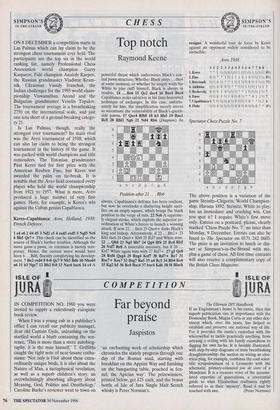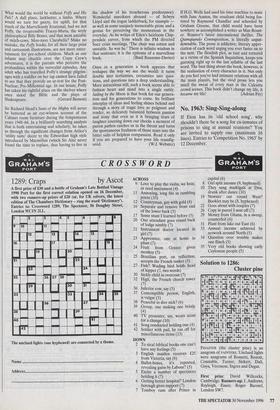Far beyond praise
Jaspistos
IN COMPETITION NO. 1960 you were invited to supply a ridiculously eulogistic book review.
When I was a young cub in a publisher's office I can recall our publicity manager, dear old Captain Gyde, unleashing on the startled world a blurb containing the sen- tence, 'This is more than a mere autobiog- raphy, it is the man himself.' T. Griffiths caught the right note of near-insane enthu- siasm: 'Not only is Vink about these extra- ordinarily unique birds, it is also about the Nature of Man, a metaphysical revelation, as well as a superb children's story, an overwhelmingly absorbing allegory about Meaning, God, Politics and Ornithology.' Caroline Burke's reviewer went to town on 'an enchanting work of scholarship which chronicles the stately progress through one day of the Roman snail, starting with breakfast on the Appian Way and finishing on the banqueting table, poached in fen- nel, the Apician way'. The prizewinners, printed below, get £25 each, and the bonus bottle of Isle of Jura Single Malt Scotch whisky is Peter Norman's.
The Ultimate DIY Handbook
If an Englishman's home is his castle, then this superb publication vies in importance with the Domesday Book, Magna Carta or any other doc- ument which, over the years, has helped to establish and preserve our national way of life. For it provides the castle's custodian with the wherewithal to tackle practically anything, from artexing a ceiling with his family escutcheon to digging his own ha-ha. It is lavishly illustrated, with step-by-step diagrams of truly breathtaking draughtsmanship: the section on wiring an elec- trical plug, for example, combines the cool scien- tific scrupulousness of a Leonardo with the schematic, primary-coloured joie de vivre of a Mondrian. It is a treasure trove of the accumu- lated expertise of generations, a reverential guide to what Elizabethan craftsmen rightly referred to as their 'mystery'. Read it and be
touched with awe. (Peter Norman)
What would the world be without Poffy and His Pals? A dull place, lacklustre; a limbo. Where Would we turn for gaiety, for uplift, for that touch of the Marvellously Irrational, had we not Poffy, the irrepressible Tracey-Maria, the wryly philosophical Billy Bones, and that most amiable of much-cows, Moo-moo Clarabella? Make no mistake, the Poffy books, for all their large print and cartoonish illustrations, are not mere enter- tainment for pre-school children. Much as our infants may chuckle over the Crazy Crew's adventures, it is the parents who perceive the profundities within the surrealist episodes. Any adult who has travelled Poffy's strange pilgrim- ages with a toddler on her lap cannot have failed to see that they provide an ur-text for the Post- Nuclear, Pre-Millennial age. In our house, Poffy has taken his rightful place on the shelves where once stood the Bible and the plays of
Shakespeare. (Gerard Benson)
Sir Richard Head's Seats of the Mighty will never be bettered as an eye-witness account of the Cabinet room furniture during the tempestuous years 1948-64. In a brilliantly searching analysis that is both entertaining and scholarly, he takes us through the significant changes from Attlee's 'utility suite' decor to the Edwardian high style introduced by Macmillan (which Sir Alec never found the time to replace, thus having to live in
the shadow of his treacherous predecessor). Wonderful anecdotes abound — of Selwyn Lloyd and the rogue ladderback, for example — as well as some uniquely memorable prose and a genius for perceiving the momentous in the everyday. As he writes of Eden's heirloom Chip- pendale carver, from which the PM directed Suez crisis meetings, 'The chair was rotten and unstable. So was he.' There is infinite wisdom in that sentence; it is the epitome of a marvellous book. (Basil Ransome-Davies)
Once in a generation a book appears that reshapes the way we see the world: it turns doubts into certainties, certainties into ques- tions, and questions into a deep understanding. More miraculous still, such a book seems able to fashion heart and mind into a single entity. Sailing by the Moon is that book for our genera- tion and for generations to come. Its brilliant interplay of ideas and feeling shines behind and through a story of tragic love so poignant and tender, so delicately balanced between passion and irony that even as it is bringing tears of laughter coursing down our cheeks a moment of purest pathos catches us in the throat and turns the spontaneous freshness of those tears into the bitter salts of helpless compassion. Read it only if you are prepared to have your life transfig-
ured. (W.J. Webster)
If H.G. Wells had used his time machine to mate with Jane Austen, the resultant child being fos- tered by Raymond Chandler and schooled by Graham Greene, that child would have been nowhere as accomplished a writer as Max Roast- er. Roaster's latest international thriller, The Quimquando Contraposition, is literally unput- downable. The prose is addictive, literary appre- ciation of each word urging you ever faster on to the next. The fiendish plot, as taut and tortured as a victim of the Spanish Inquisition, keeps you guessing right up to the last syllable of the last word. The best thing about the book, however, is the realisation of every character in it. Not only do you feel you've had intimate relations with all the main players, but the vivid prose lets you smell the sweat of every man in the Calcutta crowd scenes. This book didn't change my life, it became my life! (Adrian Fry)
No. 1963: Sing-Sing-along
If Eton has its 'old school song', why shouldn't there be a song for ex-inmates of prisons to sing at annual reunions? You are invited to supply one (maximum 16 lines). Entries to 'Competition No. 1963' by 12 December.



















































































 Previous page
Previous page